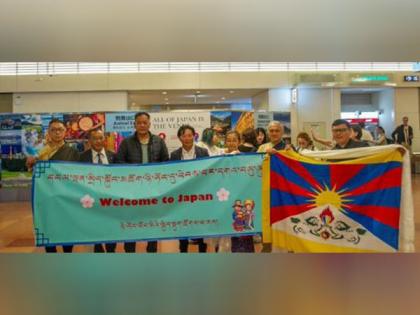Tibetan leaders urge global action at Tokyo convention, highlight China's rights abuses in Tibet
By ANI | Updated: May 30, 2025 14:18 IST2025-05-30T14:13:02+5:302025-05-30T14:18:16+5:30
Tokyo [Japan], May 30 : The leadership team from the Central Tibetan Administration (CTA) arrived in Tokyo to participate ...

Tibetan leaders urge global action at Tokyo convention, highlight China's rights abuses in Tibet
Tokyo [Japan], May 30 : The leadership team from the Central Tibetan Administration (CTA) arrived in Tokyo to participate in the 9th World Parliamentarians' Convention on Tibet (WPCT), representing a crucial moment for international involvement regarding the Tibetan situation.
As reported by the Central Tibet Administration, the delegation featured Speaker Khenpo Sonam Tenphel, Sikyong Penpa Tsering, and Deputy Speaker Dolma Tsering Teykhang, along with the Representative of the Liaison Office of Dalai Lama for Japan and East Asia.
One of the first official activities of the delegation was a meeting of high significance with the Japanese Parliamentary Support Group for Tibet at the National Diet Building. This meeting was led by Eriko Yamatani and facilitated by General Secretary Hiroshi Yamada, and included Yoshiko Sakurai, President of the Japan Institute for National Fundamentals, as per CTA's report.
During this meeting, Sikyong Penpa Tsering underscored the deteriorating human rights conditions in Tibet under the governance of the Chinese Communist Party and urged global leaders to avoid referring to Tibet as "Xizang." He also stressed the necessity for worldwide acknowledgement of His Holiness the Dalai Lama's four fundamental commitments and called on legislators to enact resolutions honouring His Holiness' life and legacy as he approaches his 90th birthday, according to the CTA's report.
Since the 1950s, Tibetans in China have endured oppression following the annexation of Tibet by the Chinese government. The 1959 uprising led to the exile of the Dalai Lama and escalated repression. Tibetan culture, language, and religious practices have faced systematic suppression. Various reports indicate that monasteries in China are heavily monitored, and religious activities face significant restrictions. Widespread surveillance exists, and dissent is met with severe punishment.
Protests against cultural erasure and human rights violations have led to instances of self-immolation. Educational systems promote Mandarin over Tibetan. The Chinese government characterises Tibetan activism as separatism, rationalising its stringent policies. Despite global concern, Beijing continues to enforce strict control, portraying its actions as efforts aimed at development and stability, while restricting access to the region for outsiders.
Disclaimer: This post has been auto-published from an agency feed without any modifications to the text and has not been reviewed by an editor
Open in app